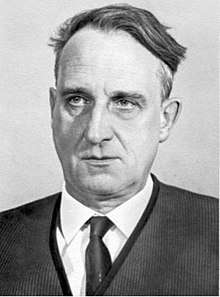Kirill Gurov
Kirill Gurov (March 6, 1918 in Moscow – September 29, 1994) was a Soviet Russian theoretical physicist working in the field of physical kinetics.
Kirill Gurov | |
|---|---|
 | |
| Born | March 6, 1918 |
| Died | September 29, 1994 (aged 76) |
| Nationality | Russian |
| Alma mater | Moscow State University (1941) |
| Known for | significant contribution to kinetic theory |
| Scientific career | |
| Fields | theoretical physics, kinetic theory |
| Institutions |
|
| Doctoral advisor | Nikolay Bogolyubov |
Gurov was born in Moscow, Russia, in the family of a military officer. In 1936, he was accepted without examinations to the Faculty of Physics and Mathematics in Moscow State University (MSU) and graduated from MSU in 1941, obtaining Diploma with Honour.
In 1944, he started to work in MSU as a PhD student under supervision of Nikolay Bogolyubov on problems of kinetic theory of quantum systems. Since 1954 and until the rest of his life Kirill Gurov worked at the A. A. Baikov Institute of Metallurgy and Material Science (IMMS).
Research
Kirill Gurov and Nikolay Bogolyubov obtained kinetic equations for quantum systems by developing the method of quantum BBGKY hierarchy.[1]
At the IMMS, Kirill Gurov worked on analysis of the diffusion processes and the corresponding phase transitions in alloys. Since the middle of the 1970s, he worked on developing materials for space projects, participated in the Apollo-Soyuz Test Project, and studied the effects of zero gravity on material properties.
Books
- Gurov K. P. (1966). Foundations of the Kinetic Theory. Method of N. N. Bogolyubov (in Russian). Moscow: Nauka.
Selected works
- Nikolay Bogolyubov; Kirill Gurov (1947). "Kinetic equations in quantum mechanics". JETP. 17 (7): 614–628.
References
- O A Bannykh, O A; et al. (1995). "Kirill Petrovich Gurov (Obituary)". Uspekhi Fizicheskikh Nauk. 38 (5): 565–566. Bibcode:1995PhyU...38..565B. doi:10.1070/PU1995v038n05ABEH001471.